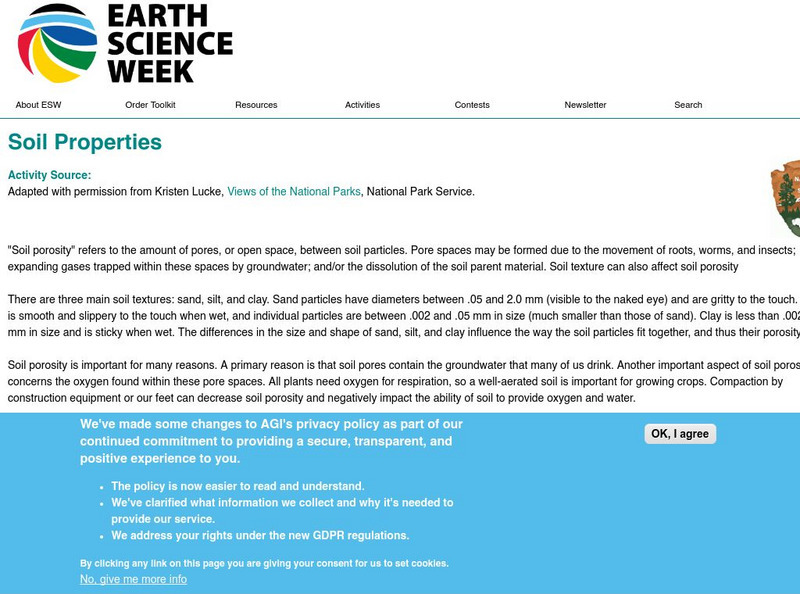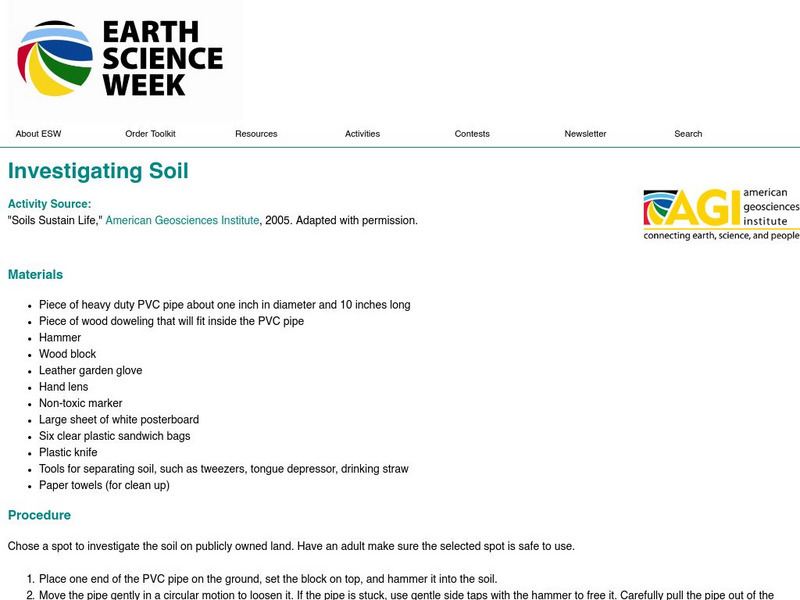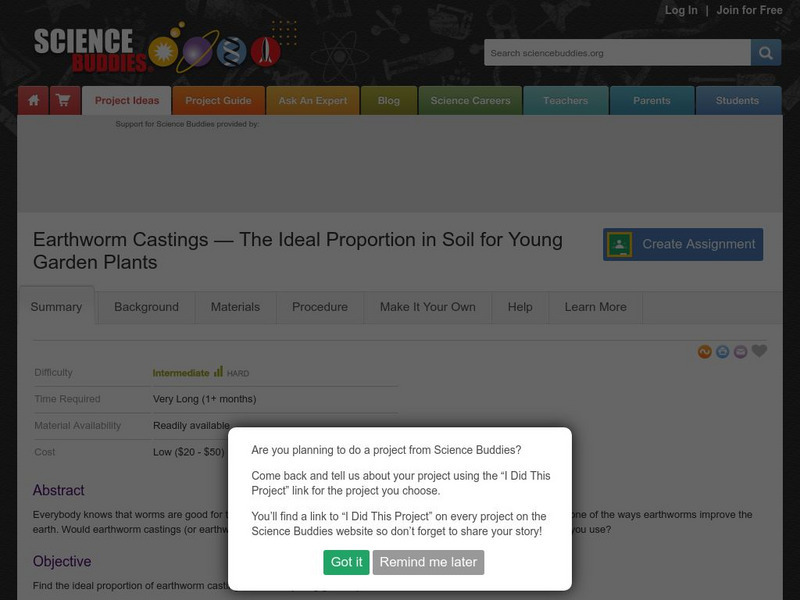Hi, what do you want to do?
Curated OER
The Grass is Always Greener
Third graders experiment with common grass and cellular division.
Curated OER
Mini-Ecosystems
Students use plastic bottles to create terrariums and plant Venus Flytraps. They observe the plants and the terrariums for illustrations of the water cycle and species' adaptations to a specific environment.
Curated OER
All Washed Up
Fourth graders simulate filtration of water containing contaminates to determine how nature cleans water. They make predictions, report observations, and construct reasonable explanations concerning their outcomes. then connect this to...
Curated OER
Replanting the Rainforest
Students practice problem solving techniques. They interpret data gathered by student researchers in Australia about the effectiveness of various strategies for controlling weed growth in a newly replanted rainforest.
Curated OER
The Water Cycle
Fifth graders review and discuss, "The Water Cycle" and its key elements of evaporation, condensation and precipitation. They create a terrarium in groups to connect concepts of The Water Cycle and to view precipitation, condensation,...
Curated OER
Riparian Zones Grades 4-8
Students examine and analyze the Riparian Zones found on the edges of streams and lakes. They assess why those are such valuable ecosystems and then conduct actual field research on riparian zones and conclude by drawing conclusions from...
Curated OER
Earth in the Hot Seat
Young scholars identify the different viewpoints on the issue of global warming. While watching a video, they take notes on the issues presented to them and answer questions about what Alaska, Peru and East Africa are doing to prevent...
Curated OER
Dinner in a Woodland
After reading a short paragraph about what makes up a woodland habitat, fifth graders attempt to identify the primary consumers, secondary consumers, and third order consumers in two separate food chain scenarios. They also name a hawk's...
Curated OER
Plant Life Cycle Activities and Lesson Plans
Curb spring fever by bringing some of the great outdoors into your classroom with plant life cycle activities.
Curated OER
Frost Depth Study
Young scholars complete activities to study the frost and frost depth. In this frost study lesson, students use frost tubes to study and measure the frost at their school. Young scholars measure the frost in the tube and enter their data...
Teach Engineering
Breathing Cells
Pairs work together to determine whether unknown solutions are either acids or bases by using a red cabbage indicator solution. After determining the general pH of the unknown solution, classmates blow into the same indicator after...
Curated OER
Measure Up!
Discover ways to measure items without standard tools. In this measurements lesson, learners estimate how long certain objects are by measuring with a non-standard measuring tool. Students check their estimates with a ruler and share...
Curated OER
Square Foot Garden
Students plant a garden and keep track of it. In this geometrical garden lesson, students collect data from their garden twice a week. They graph their finding and figure out how many square feet of growing space each person needs...
Curated OER
Landforms
Young scholars begin their examination of landforms. Using a map, they locate and identify the major landforms on Earth. They discuss how landforms affect the lifestyle of the community and determine which goods and services the...
Curated OER
Polygons, Pingos, and Themokarst! Oh MY!
Students complete activities to learn about the common land features in Alaska. For this land study lesson, students study an overhead for permafrost features. Students define ice wedge polygons, thermokarst, and pingos. Students also...
Curated OER
Creeping and Crawling Observing Mealworms and Earthworms
Fifth graders observe mealworms and earthworms. In this mealworm and earthworm lesson, 5th graders complete an experiment in which they observe the life cycle and living conditions of mealworms and earthworms. They experiment with...
Curated OER
Ions in the Environment
Learners explain the importance of the five main biogeochemical cycles. In this chemistry lesson, students discuss how ions are transported in the environment. They design an experiment to collect data on eutrophication.
Curated OER
Addendum to the Written Curriculum: Measuring Solids
Students use standard rulers to measure the length of common classroom items - such as pencils, books, desk tops - in inches and centimeters, and measure weight in pounds. They also answer math questions, such as "How long is the front...
American Geosciences Institute
American Geosciences Institute: Earth Science Week: Soil Properties
Students investigate soil porosity by building a model using the three main soil textures: sand, silt, and clay.
American Geosciences Institute
American Geosciences Institute: Earth Science Week: Investigating Soil
Young scholars chose a spot to investigate the soil on publicly owned land.
Huntington Library
Huntington Library: Garden Lesson Plans: Rooting Into the Soil [Pdf]
An experiment to investigate the capacity of different soils to retain water, and how this impacts on the survival, evolution, and adaptations of plants. Extension activities are included.
Science Buddies
Science Buddies: Earthworm Castings: Soil for Young Garden Plants
Everybody knows that worms are good for the soil, but not everybody knows why. Here's a project that investigates just one of the ways earthworms improve the earth.
Science Buddies
Science Buddies: Solid Ground? Measuring Soil Bearing Capacity
Foundations for many types of structures rest on soil. This project shows how you can investigate the bearing capacity of different types of soil.
Georgia Department of Education
Ga Virtual Learning: Forensic Properties of Glass and Soil Evidence
In this comprehensive interactive tutorial you will investigate the area of forensic science and how the various types of evidence differ. Learn what types of crimes involve glass and soil and what ways these types of evidence are...

























![Huntington Library: Garden Lesson Plans: Rooting Into the Soil [Pdf] Activity Huntington Library: Garden Lesson Plans: Rooting Into the Soil [Pdf] Activity](https://static.lp.lexp.cloud/images/attachment_defaults/resource/large/FPO-knovation.png)


